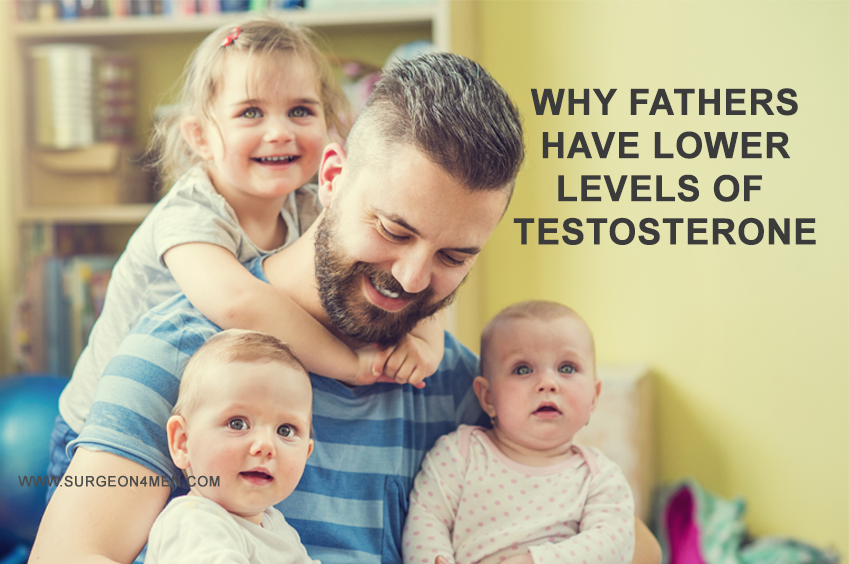Why Fathers Have Lower Levels Of Testosterone
This sounds weird, isn’t it? Because according to popular notion, men with higher testosterone are more likely to successfully impregnate their partners as they have superior quality sperms. However, as per the results of a new study reported in the Proceedings of the National Academy of Sciences (1), investigators suggested that just like females, men are also biologically programmed to respond to parenthood.
Details Of The Study
The cross-sectional study was conducted in Philippines at Northwestern University on a sample of 624 healthy adult males. The baseline testosterone samples were collected in 2005 when these men were single and fatherless at the age of 21 years. The men with high waking testosterone levels (measured by salivary testosterone secretion) were followed over the course of next 5 years with a hypothesis that “males with high testosterone levels are more likely to become fathers during follow-up period”.
After the completion of follow-up period, the waking samples of testosterone were collected again and investigators discovered that:
- Partnered fathers have experienced a significant decline in waking testosterone levels, when compared to fatherless single individuals in the group.
- The dip in testosterone levels is more severe in the evening (-34%) than morning (-26%).
- The testosterone dip was 4-5 times lower in men who have very young babies (neonates or younger); when compared to men with older kids (aged 1 year or older). This is mainly due to the fact that caring for very young babies is more challenging (both emotionally and physically).
What Causes Testosterone Decline In New Fathers?
Investigators hypothesized that the core cause is ‘child interaction and caregiving’. To test the credibility of this hypothesis, the testosterone levels of fathers who actively participate in caregiving (up to 3 hours or more in simple interactive activities such as playing, feeding, bathing, watching television with kids etc.) were compared against those fathers who spends less time with the kid. The results suggested that dip in testosterone levels is significant in men who participates actively in caregiving.
The results of this study aligns with the popular notion that men have high testosterone levels at the time of mating but declines significantly when they are in steady, satisfying relationships. Several studies conducted in different parts of the world yield similar results (2, 3). This could be a natural mechanism to engage fathers in caregiving and nurturing activities instead of mating or competitive behavior (3).
Are There Any Adverse Effects Of Testosterone Decline In New Fathers?
Various research and clinical studies suggested that female hormones declines after childbirth as a biological mechanism to raise the family. It is also a known fact that libido and sex drive in women also declines after having a baby. But scientists are now re-exploring this notion.
Since mild or moderately low testosterone levels interferes with the libido and sex drive in men, it is quite possible that the less frequent sex in new parents is due to declining testosterone in fathers and low estrogen in women. Also, since low testosterone levels are associated with a non-risk taking behavior, partnered father feel more compelled to stay home and spend time with the family instead of exploring new adventures and mating experiences outside.
References:
1. Gettler, L. T., McDade, T. W., Feranil, A. B., & Kuzawa, C. W. (2011). Longitudinal evidence that fatherhood decreases testosterone in human males. Proceedings of the National Academy of Sciences, 108(39), 16194-16199.
2. Gray, P. B., Kahlenberg, S. M., Barrett, E. S., Lipson, S. F., & Ellison, P. T. (2002). Marriage and fatherhood are associated with lower testosterone in males. Evolution and Human Behavior, 23(3), 193-201.
3. Gray, P. B., Yang, C. F. J., & Pope, H. G. (2006). Fathers have lower salivary testosterone levels than unmarried men and married non-fathers in Beijing, China. Proceedings of the Royal Society of London B: Biological Sciences, 273(1584), 333-339.
4. Wynne-Edwards, K. E., & Timonin, M. E. (2007). Paternal care in rodents: weakening support for hormonal regulation of the transition to behavioral fatherhood in rodent animal models of biparental care. Hormones and Behavior, 52(1), 114-121.
